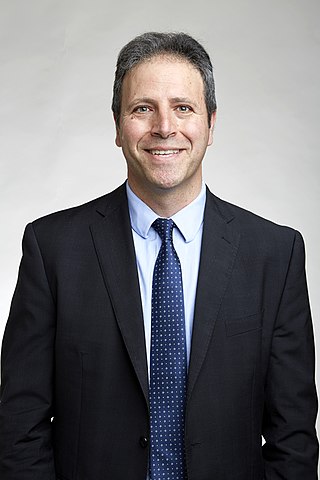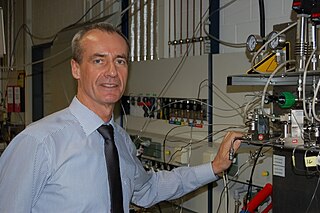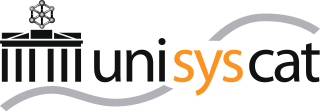Related Research Articles

The Max Planck Society for the Advancement of Science is a formally independent non-governmental and non-profit association of German research institutes. Founded in 1911 as the Kaiser Wilhelm Society, it was renamed to the Max Planck Society in 1948 in honor of its former president, theoretical physicist Max Planck. The society is funded by the federal and state governments of Germany.

The Gottfried Wilhelm Leibniz Prize, or Leibniz Prize, is awarded by the German Research Foundation to "exceptional scientists and academics for their outstanding achievements in the field of research". Since 1986, up to ten prizes have been awarded annually to individuals or research groups working at a research institution in Germany or at a German research institution abroad. It is considered the most important research award in Germany.
The Max Planck Institute of Colloids and Interfaces is located in Potsdam-Golm Science Park in Golm, Potsdam, Germany. It was founded in 1990 as a successor of the Institute for Physical Chemistry and for Organic Chemistry, both in Berlin-Adlershof, and for Polymer Chemistry in Teltow. In 1999, it transferred to newly constructed extension facilities in Golm. It is one of 80 institutes in the Max Planck Society (Max-Planck-Gesellschaft).

The Fritz Haber Institute of the Max Planck Society (FHI) is a science research institute located at the heart of the academic district of Dahlem, in Berlin, Germany.

Gerhard Ertl is a German physicist and a Professor emeritus at the Department of Physical Chemistry, Fritz-Haber-Institut der Max-Planck-Gesellschaft in Berlin, Germany. Ertl's research laid the foundation of modern surface chemistry, which has helped explain how fuel cells produce energy without pollution, how catalytic converters clean up car exhausts and even why iron rusts, the Royal Swedish Academy of Sciences said.
The Berlin Graduate School of Natural Sciences and Engineering (BIG-NSE) is part of the Cluster of Excellence "Unifying Concepts in Catalysis" (UniCat) founded in November 2007 by the Technical University of Berlin and five further institutions in the Berlin area within the framework of the German government‘s Excellence Initiative.
Frank Klaus Glorius is a German chemist and W3-Professor of organic chemistry in the Department of Chemistry and Pharmacy at the University of Münster.

Peter H. Seeberger is a German chemist.
Beatriz Roldán Cuenya is a Spanish physicist working in surface science and catalysis. Since 2017 she has been director of the Department of Interface Science at the Fritz Haber Institute of the Max Planck Society in Berlin, Germany. Since April 2023, she has also been interim director of the Department of Inorganic Chemistry, also at the Fritz Haber Institute.

Francesco Caruso is Melbourne Laureate Professor and National Health and Medical Research Council (NHMRC) Senior Principal Research Fellow in the School of Chemical and Biomolecular Engineering at the University of Melbourne, Australia. Caruso is deputy director of the Australian Research Council (ARC) Centre of Excellence in Convergent Bio-Nanoscience and Technology.
The Berlin University Alliance is a consortium of three universities and one hospital in Berlin: the Free University of Berlin, the Humboldt University of Berlin, the Technische Universität Berlin, and the Charité – Berlin University of Medicine.

Jürgen Caro is a German chemist.

Matthias Scheffler is a German theoretical physicist whose research focuses on condensed matter theory, materials science, and artificial intelligence. He is particularly known for his contributions to density-functional theory and many-electron quantum mechanics and for his development of multiscale approaches. In the latter, he combines electronic-structure theory with thermodynamics and statistical mechanics, and also employs numerical methods from engineering. As summarized by his appeal "Get Real!" he introduced environmental factors into ab initio calculations. In recent years, he has increasingly focused on data-centric scientific concepts and methods and on the goal that materials-science data must become "Findable and Artificial Intelligence Ready".
Peter Strasser is a German chemist. He is the winner of the 2021 Faraday Medal.
Juri Rappsilber is a German chemist in the area of mass spectrometry and proteomics.

The Cluster of Excellence Unifying Systems in Catalysis (UniSysCat) is an interdisciplinary research network funded by the German Research Foundation (DFG) as a part of the federal and state initiative called Excellence Strategy of Germany, Exzellenzstrategie. The funding period runs from January 1, 2019 to December 31, 2025.
Janina Kneipp is a German scientist who is Professor of Physical Chemistry Humboldt University of Berlin. Her research considers surface enhanced Raman scattering and plasmonic enhancement in multi-modal micro spectroscopy.
Peter Fratzl is an Austrian physicist and director at the Max Planck Institute of Colloids and Interfaces in Potsdam.
Helmuth Möhwald was a German physicist and founding director of the Max Planck Institute for Colloids and Interfaces in Potsdam. His research focus on molecular interfaces, ultrathin films, coated colloids and capsules, membranes, and nanostructured and functional interfaces.
Anna Fischer is a German chemist who is a Professor of Nanomaterials at the University of Freiburg. Her research considers the development of nanomaterials for electrocatalysis.
References
- ↑ "Poröse Silikate durch Nanocasting: von chiralen Templaten zu neuer Chemie in Poren". German National Library. Retrieved 15 April 2022.
- ↑ "Falling Walls People: Arne Thomas". Falling Walls Foundation. Retrieved 15 April 2022.
- ↑ "Unifying Systems in Catalysis (UniSysCat)". Berlin University Alliance. Retrieved 15 April 2022.
- ↑ "Arne Thomas". Clarivate - Web of Science. Retrieved 14 April 2022.
- ↑ "Organic Zeolites (ORGZEO)". European Commission. Retrieved 14 April 2022.
- ↑ "Bayer Early Excellence in Science Award". Informationsdienst Wissenschaft. Retrieved 14 April 2022.